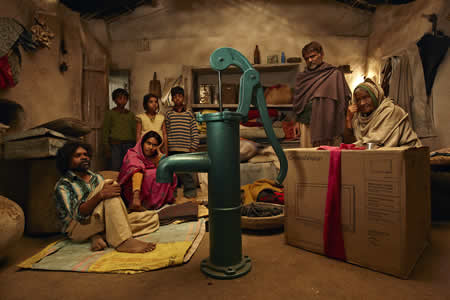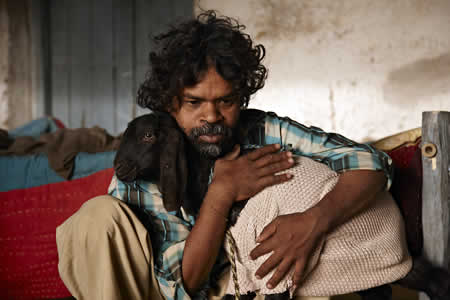 Written and directed by Anusha Rizvi, PEEPLI LIVE was produced by Aamir Khan (3 IDIOTS, the Oscar nominated LAGAAN), one of India’s most popular actors who is also an award-winning director and producer. PEEPLI LIVE was the first Indian film ever shown in competition at the Sundance Film Festival (2010) and also played at this year’s Berlin Film Festival.
Written and directed by Anusha Rizvi, PEEPLI LIVE was produced by Aamir Khan (3 IDIOTS, the Oscar nominated LAGAAN), one of India’s most popular actors who is also an award-winning director and producer. PEEPLI LIVE was the first Indian film ever shown in competition at the Sundance Film Festival (2010) and also played at this year’s Berlin Film Festival.
After losing their plot of land over an unpaid government loan, Natha and Budhia, two brothers and farmers residing in the heart of rural India, seek the help of a local politician. Not concerned with their plight, the politician mockingly suggests that the brothers commit suicide to benefit from a government scheme that aids the families of indebted farmers who have killed themselves. Budhia, the shrewder of the two, immediately encourages Natha, a simpleton by nature, to think of the greater good of their family and do what is necessary. After their drunken conversation in a bar is overheard by a journalist, the next day it appears in a local newspaper under the header “A Death Foretold in Peepli Village.” The article sparks a chain of events that reaches the highest corridors of power in India’s political machinery. With elections around the corner what would otherwise have been common fare turns into a ‘cause célèbre’ with everybody wanting a piece of the action. From the glitzy television studios in New Delhi to the Agricultural Ministry, journalists, newsmen, local and national politicians descend upon the little village to stake their claim. The question on everyone’s lips is, “Will he or won’t he?” As the circus propagates itself, what will be the fate of poor farmer Natha who nobody stops to ask how he really feels?
Here is CWB’s interview with Aamir Khan, producer of PEEPLI LIVE.
Bijan Tehrani: PEEPLI LIVEwas so unexpected, interesting and shocking in a way. One should be really brave in the climate of cinema in India.
Aamir Khan: When I read the script, it really hit home to me. It’s a very funny story that has some great characters; the film is not only funny but heartbreaking and thought provoking. The film is  social and political which is very unusual for Indian Cinema, so I thought that we should do it.
social and political which is very unusual for Indian Cinema, so I thought that we should do it.
BT: How much of PEEPLI LIVE is based on real life in India?
AK: It’s fairly accurate and this is a very real film. Everything you see in the film happens almost everyday back home in rural India.
BT: When you got the script, how did you come up with the visual style of the film?
AK: When I read the script I told the director that she wrote a great script but I don’t think that they would be able to make it into a film. So I told her to shoot a few scenes for me; I picked some really tough scenes for her to shoot and then cut them into a film for me to see. When I saw those tense scenes, I really loved the command that she had over the medium and that gave me the confidence in trusting her to direct the film. I think that when I saw the first cut of the film, I marveled at how she had brought out what she had on paper to the screen. It has a very real feel, but also very entertaining, engaging, and funny; it is also very sad and thought provoking and she has really managed that beautifully.
BT: How much did you work with her during the making of PEEPLI LIVE?
AK: Not much, really. I was involved in the final stages of the prep and she also had a three-week workshop with the actors in which I stepped in during the last two or three days and what I saw, I liked. I was shooting a film as an actor so I was not on set while she was shooting it. I saw the dailies, of course, to make sure that she was going on the right track. This is pretty much her voice and her expression and it contains very little of me in terms of its execution. Perhaps that stage that I came in and contributed would be in the final cut in the film; as a producer, we usually get the cut right.
BT: As some who has experience in acting, where you happy with the casting choices made in the film? AK: I was amazed with the performances, I was really amazed. I think that the casting process was really exhausting. The worked extensively on the casting and they really looked for fresh new faces and people who were from that background in India. I have been acting for the past twenty years; I can say that each one of the actors has performed incredibly well.
AK: I was amazed with the performances, I was really amazed. I think that the casting process was really exhausting. The worked extensively on the casting and they really looked for fresh new faces and people who were from that background in India. I have been acting for the past twenty years; I can say that each one of the actors has performed incredibly well.
BT: How do you compare her to the great filmmakers in India and what do you think about her potential as a filmmaker?
AK: I think that she has a lot of potential; I think that her background as a journalist has really helped her to shape her voice and her thoughts.
BT: How has the reaction been to PEEPLI LIVE in India?
AK: Well, the film will be released in India on the same day that it is released in the US, which is the 13th of August. But the film was shown in completion at Sundance and at Berlin and it got really great reviews. The audiences have primarily been from outside of India. We tested the film extensively before we made the final cut and, at that time, we tested the film with audiences back home in India and we got a great response.
BT: What has been the political response to PEEPLI LIVE?
AK: That will be curious to see. But I feel that we are first human beings and I feel that the film will connect with anyone on a human level. While the film is a satire and takes one point of view, back home in India there are a lot of politicians that are trying to do good work and there are people in the media that are trying to do good work. So I feel that there are people in the political circles and in the media circles that will really enjoy the film. Plus, our director does not take a judgmental stance: she just presents things as she sees them.
BT: Do you have any new projects line up?
AK: Not at this point. I’m not even sure whether she is going to make another film. She does not see herself as a filmmaker; she had a story to tell and I’m not sure if she has another story to tell. After this film premier, the next film will be a film directed by wife called Tropic Heart, which will premiere in Toronto in September. I also have a film called Delhi Belly, it’s a comedy about these kids that live in a dilapidated house and get into trouble with the mafia, so all of these films go against the rules of Indian cinema.

